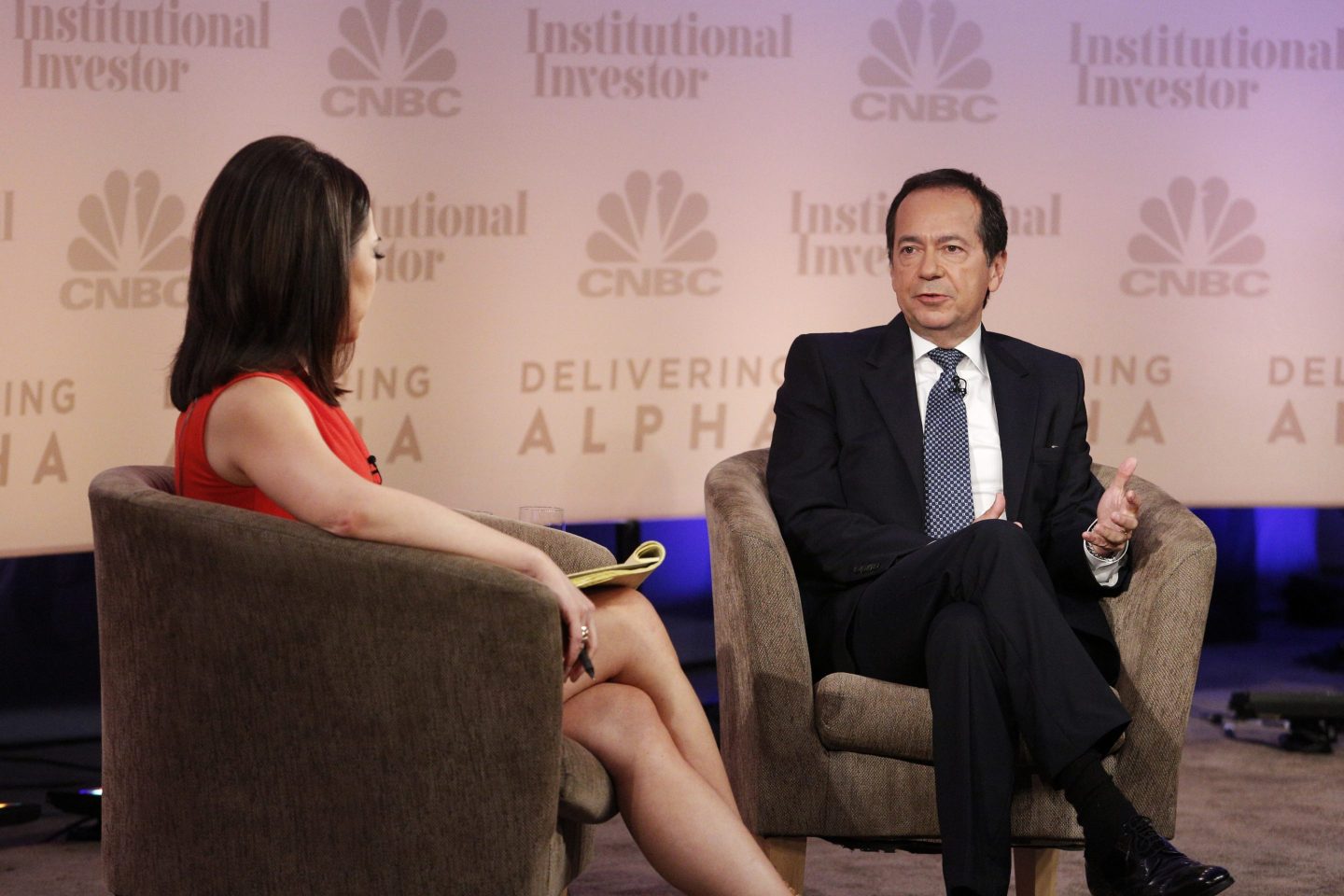知名对冲基金经理:房价下跌不会导致金融体系崩溃

美国房地产市场正在经历史上最迅速、最剧烈的转变之一。
原因很简单:飙升的抵押贷款利率让全国各地的购房者望而却步。
而且这还远远没有结束。上周,美联储(Federal Reserve)的主席杰罗姆·鲍威尔甚至称这是一次“艰难的修正”。
虽然经济放缓的速度和广度让一些美国人担心2008年房地产泡沫破裂和随后的全球金融危机会重演,但其他人并不那么担心。对冲基金经理约翰·保尔森就是相信历史不会重演的人之一,他曾经在2008年因为做空美国房地产市场而获利40亿美元,一举成名。
保尔森在9月25日对彭博社(Bloomberg)表示:“我们现在不像以前那样面临金融体系崩溃的风险。的确,住房市场可能有点泡沫。因此,房价可能会下降,也可能会趋于平稳,但不会达到2008年那样的程度。”
两位华尔街权威的故事
保尔森在1994年创立了自己的对冲基金保尔森公司(Paulson & Co.,后来转变为家族办公室),拥有30亿美元的净资产。他认为,住房市场的基础比大金融危机(Great Financial Crisis)之初更加稳固。
他说:“如今抵押贷款的潜在质量要好得多。市场上甚至没有次级抵押贷款。在那个时期(2008年),没有首付,没有信用检查,杠杆率非常高。这与今天的情况正好相反。因此,如今抵押贷款的信用质量不像当时那么糟糕了。”
在2008年房地产泡沫破裂和随后的全球金融危机之后,参议员们通过了《多德-弗兰克华尔街改革和消费者保护法》(Dodd-Frank Wall Street Reform and Consumer Protection Act),以确保美国金融体系稳定,并提高美国抵押贷款的质量。
该法案成立了美国消费者金融保护局(Consumer Financial Protection Bureau),负责防止掠夺性贷款。自美国消费者金融保护局成立以来,购房者的平均信用评级大幅提高。在2008年房地产泡沫破裂之前,美国购房者的平均信用评级为707。根据Bankrate的数据,今年第一季度,美国购房者的平均信用评级为776。
托马斯·桑顿领导的美国银行研究(Bank of America Research)的分析师团队还发现,所谓的“超级”FICO信用分在720 分或以上的购房者比例在今年夏天达到了75%。在2008年房地产泡沫破裂之前的几年里,只有25%的购房者拥有类似的良好信用。
《多德-弗兰克法案》(Dodd-Frank Act)还设立了美国金融稳定监管委员会(Financial Stability Oversight Council)和美国证券交易委员会信用评级办公室(Securities and Exchange Commission Office of Credit Ratings)。金融稳定监管委员会负责监督美国主要金融公司的健康状况,并为银行设定准备金要求。美国证券交易委员会信用评级办公室是在批评人士认为私人机构在金融危机期间给出误导性评级后设立的,负责核实主要金融公司的信用评级。这两个监管机构都有助于在经济困难时期提高美国金融体系和银行的弹性。
保尔森在9月25日指出,银行在金融危机期间的杠杆率很高,并且在《多德-弗兰克法案》确立沃尔克规则(Volcker Rule)后承担了在当今市场上被视为不可接受的风险。沃尔克规则阻止银行进行某些特定类型的高风险投资。
“当时的问题是,银行的投资项目风险性很高。它们有很多高风险的次级、高收益、杠杆贷款。当市场开始下滑时,股票迅速承压。”他指出,如今,普通银行股票是2008年大金融危机期间的三到四倍,这使它们不太容易出现违约。
虽然保尔森并不担心2008年的危机会重演,但对冲基金经理迈克尔·伯里多年来一直警告说,他认为全球经济正处于“有史以来最大的投机泡沫”中。正如《大空头》(The Big Short)一书和电影中所描述的那样,对冲基金投资人迈克尔·伯里也因为预测大金融危机并从大金融危机中获利而声名鹊起。
伯里认为,在大金融危机之后,各国央行通过宽松的货币政策在从股票到房地产的各个领域制造了泡沫,而新冠疫情时期旨在提振经济的支出只会让情况变得更糟。
如今,随着世界各国央行官员转变立场以对抗通胀,并一致持续加息,这位对冲基金负责人认为,资产价格将大幅下跌。
“许多行业的风险都在增加。这种不受约束的叙事一直在自我膨胀,直到谬论被推翻,向所有人揭示这种叙事是多么愚蠢,这也很容易引发一场革命。”伯里在9月21日的一条隐晦推文中表示,这条推文目前已经被删除。(财富中文网)
译者:中慧言-王芳
美国房地产市场正在经历史上最迅速、最剧烈的转变之一。
原因很简单:飙升的抵押贷款利率让全国各地的购房者望而却步。
而且这还远远没有结束。上周,美联储(Federal Reserve)的主席杰罗姆·鲍威尔甚至称这是一次“艰难的修正”。
虽然经济放缓的速度和广度让一些美国人担心2008年房地产泡沫破裂和随后的全球金融危机会重演,但其他人并不那么担心。对冲基金经理约翰·保尔森就是相信历史不会重演的人之一,他曾经在2008年因为做空美国房地产市场而获利40亿美元,一举成名。
保尔森在9月25日对彭博社(Bloomberg)表示:“我们现在不像以前那样面临金融体系崩溃的风险。的确,住房市场可能有点泡沫。因此,房价可能会下降,也可能会趋于平稳,但不会达到2008年那样的程度。”
两位华尔街权威的故事
保尔森在1994年创立了自己的对冲基金保尔森公司(Paulson & Co.,后来转变为家族办公室),拥有30亿美元的净资产。他认为,住房市场的基础比大金融危机(Great Financial Crisis)之初更加稳固。
他说:“如今抵押贷款的潜在质量要好得多。市场上甚至没有次级抵押贷款。在那个时期(2008年),没有首付,没有信用检查,杠杆率非常高。这与今天的情况正好相反。因此,如今抵押贷款的信用质量不像当时那么糟糕了。”
在2008年房地产泡沫破裂和随后的全球金融危机之后,参议员们通过了《多德-弗兰克华尔街改革和消费者保护法》(Dodd-Frank Wall Street Reform and Consumer Protection Act),以确保美国金融体系稳定,并提高美国抵押贷款的质量。
该法案成立了美国消费者金融保护局(Consumer Financial Protection Bureau),负责防止掠夺性贷款。自美国消费者金融保护局成立以来,购房者的平均信用评级大幅提高。在2008年房地产泡沫破裂之前,美国购房者的平均信用评级为707。根据Bankrate的数据,今年第一季度,美国购房者的平均信用评级为776。
托马斯·桑顿领导的美国银行研究(Bank of America Research)的分析师团队还发现,所谓的“超级”FICO信用分在720 分或以上的购房者比例在今年夏天达到了75%。在2008年房地产泡沫破裂之前的几年里,只有25%的购房者拥有类似的良好信用。
《多德-弗兰克法案》(Dodd-Frank Act)还设立了美国金融稳定监管委员会(Financial Stability Oversight Council)和美国证券交易委员会信用评级办公室(Securities and Exchange Commission Office of Credit Ratings)。金融稳定监管委员会负责监督美国主要金融公司的健康状况,并为银行设定准备金要求。美国证券交易委员会信用评级办公室是在批评人士认为私人机构在金融危机期间给出误导性评级后设立的,负责核实主要金融公司的信用评级。这两个监管机构都有助于在经济困难时期提高美国金融体系和银行的弹性。
保尔森在9月25日指出,银行在金融危机期间的杠杆率很高,并且在《多德-弗兰克法案》确立沃尔克规则(Volcker Rule)后承担了在当今市场上被视为不可接受的风险。沃尔克规则阻止银行进行某些特定类型的高风险投资。
“当时的问题是,银行的投资项目风险性很高。它们有很多高风险的次级、高收益、杠杆贷款。当市场开始下滑时,股票迅速承压。”他指出,如今,普通银行股票是2008年大金融危机期间的三到四倍,这使它们不太容易出现违约。
虽然保尔森并不担心2008年的危机会重演,但对冲基金经理迈克尔·伯里多年来一直警告说,他认为全球经济正处于“有史以来最大的投机泡沫”中。正如《大空头》(The Big Short)一书和电影中所描述的那样,对冲基金投资人迈克尔·伯里也因为预测大金融危机并从大金融危机中获利而声名鹊起。
伯里认为,在大金融危机之后,各国央行通过宽松的货币政策在从股票到房地产的各个领域制造了泡沫,而新冠疫情时期旨在提振经济的支出只会让情况变得更糟。
如今,随着世界各国央行官员转变立场以对抗通胀,并一致持续加息,这位对冲基金负责人认为,资产价格将大幅下跌。
“许多行业的风险都在增加。这种不受约束的叙事一直在自我膨胀,直到谬论被推翻,向所有人揭示这种叙事是多么愚蠢,这也很容易引发一场革命。”伯里在9月21日的一条隐晦推文中表示,这条推文目前已经被删除。(财富中文网)
译者:中慧言-王芳
The U.S. housing market is experiencing one of the most rapid and dramatic shifts in its history.
The reason is pretty simple: Spiked mortgage rates are sidelining buyers across the country.
And it’s far from over. Last week, Fed Chair Jerome Powell even went as far as to call it a “difficult correction.”
While the speed and breadth of the slowdown have some Americans worried about a repeat of the 2008 housing bust and subsequent global financial crisis, others aren’t as concerned. John Paulson, the hedge funder who famously pocketed $4 billion betting against the U.S. housing market in 2008, is among those who believe history isn’t repeating itself.
“We’re not at risk of a collapse today in the financial system like we were before,” Paulson told Bloomberg on September 25. “Yeah, it’s true, housing may be a little frothy. So housing prices may come down or they may plateau, but not to the extent it happened [in 2008].”
A tale of two Wall Street oracles
Paulson, who started his hedge fund (which has since been converted to a family office), Paulson & Co., in 1994 and boasts a net worth of $3 billion, believes that the housing market is on stronger footing than it was at the start of the Great Financial Crisis.
“The underlying quality of the mortgages today is far superior. You don’t even have any subprime mortgages in the market,” he said. “In that period [2008], there was no down payments, no credit checks, very high leverage. And it’s just the opposite of what’s happening today. So you don’t have the degree of poor credit quality in mortgages that you did at that time.”
After the blow-up of the 2008 housing bubble and subsequent global financial crisis, senators passed the Dodd-Frank Wall Street Reform and Consumer Protection Act in order to ensure the stability of the U.S. financial system and improve the quality of U.S. mortgages.
The act created the Consumer Financial Protection Bureau (CFPB), which is tasked with preventing predatory mortgage lending. In the years since the CFPB’s creation, the average credit rating of homebuyers has improved dramatically. Leading up to the 2008 housing bust, U.S. homebuyers’ average credit rating was 707. In the first quarter of this year, it was 776, according to data from Bankrate.
Bank of America Research analysts led by Thomas Thornton also found that the portion of buyers with so-called “superprime” FICO scores of 720 or above hit 75% this summer. During the years preceding the 2008 housing bust, just 25% of buyers boasted similarly strong credit.
The Dodd-Frank Act also established the Financial Stability Oversight Council which monitors the health of major U.S. financial firms and sets reserve requirements for banks, and the Securities and Exchange Commission (SEC) Office of Credit Ratings which verifies the credit ratings of major firms after critics argued private agencies gave misleading ratings during the financial crisis. Both of these regulatory bodies have helped to improve the resiliency of the U.S. financial system and banks during times of economic stress.
Paulson noted on September 25 that banks were highly leveraged during the financial crisis and took risks that would be seen as unacceptable in today’s markets after the Dodd-Frank act established the Volcker Rule, which prevents banks from making some specific types of risky investments.
“The problem, in that period of time, was the banks were very speculative about what they were investing in. They had a lot of risky subprime, high-yield, levered loans. And when the market started to fall, the equity quickly came under pressure,” he said, noting that the average bank now has three to four times as much equity as they did during the Great Financial Crisis of 2008, which makes them less susceptible to default.
While Paulson isn’t worried about a repeat of 2008, hedge funder Michael Burry, who also rose to fame predicting and profiting from the Great Financial Crisis, as depicted in the book and movie “The Big Short,” has warned for years that he believes the global economy is in the “greatest speculative bubble of all time in all things.”
Burry argues that central banks created a bubble in everything from stocks to real estate with loose monetary policies after the Great Financial Crisis, and pandemic-era spending meant to boost the economy only made things worse.
Now, as central bank officials around the world shift stances to fight inflation and continue raising interest rates in unison, the hedge fund chief argues asset prices will fall dramatically.
“There is risk growing in many sectors. The unfettered narrative feeding itself until the absurdity explodes, revealing the folly to all and easily starting a revolution,” Burry said in a cryptic, since-deleted Sept. 21 tweet.













